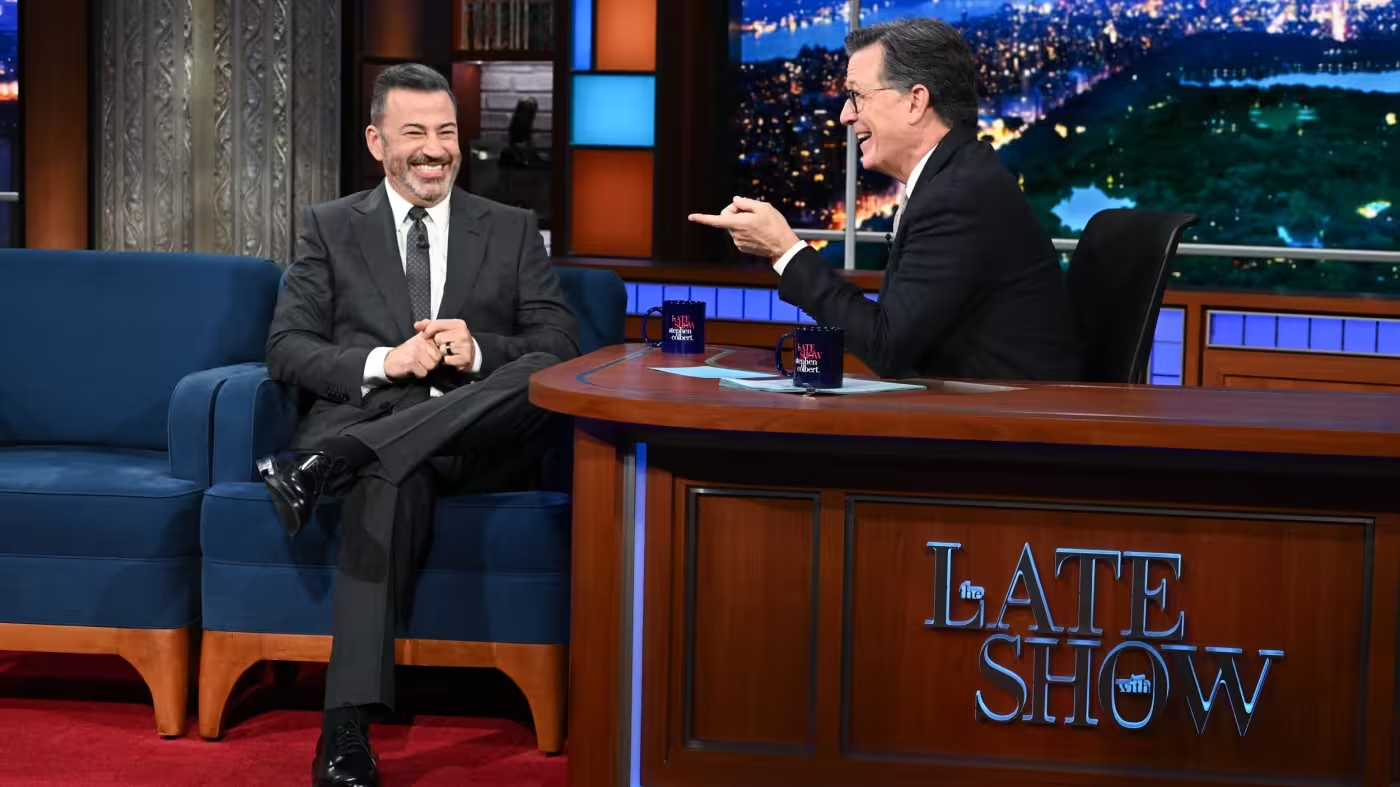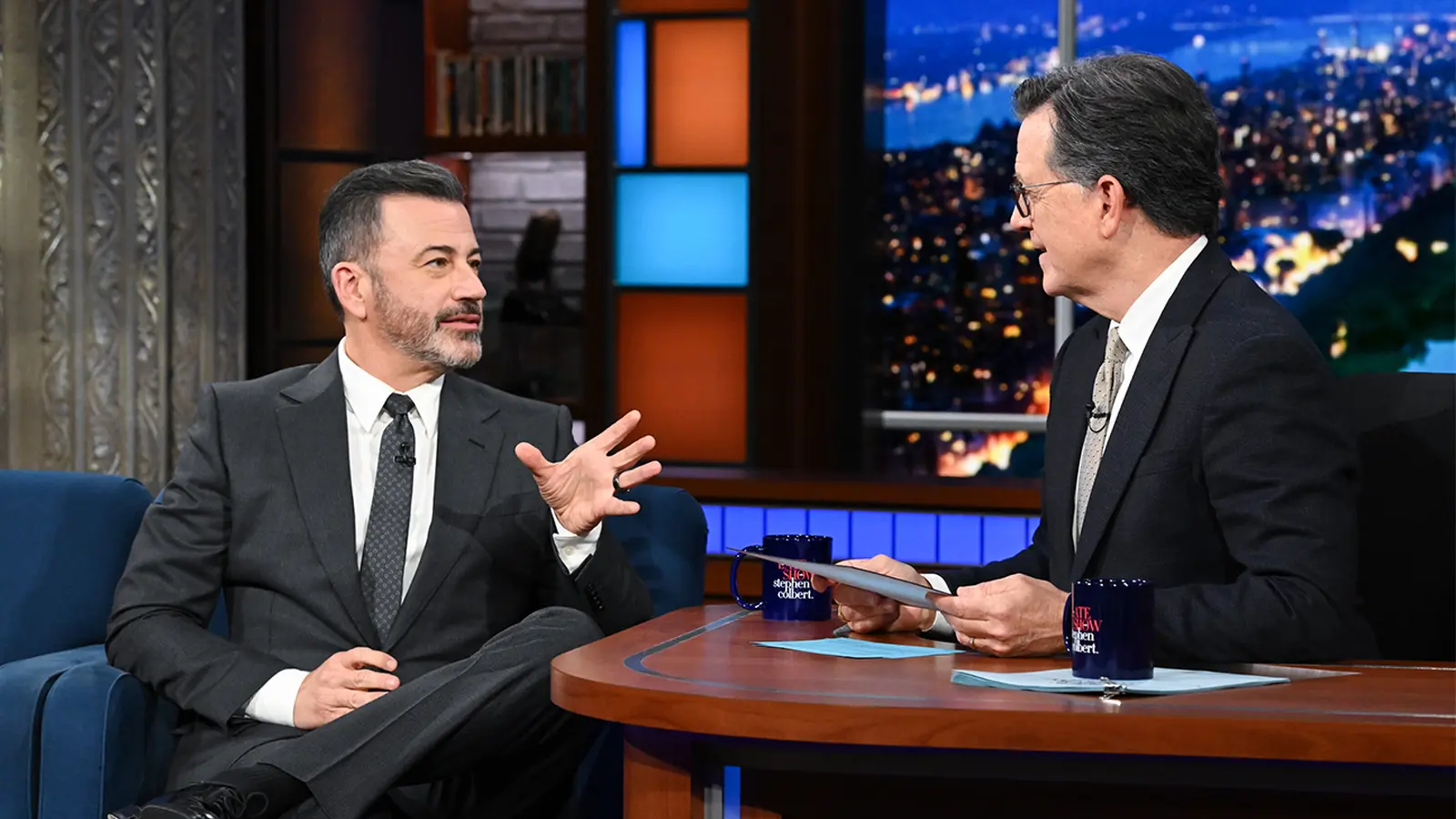7 Minutes
What happened: a late‑night shockwave
Jimmy Kimmel's abrupt, brief suspension from ABC’s airwaves last month felt less like a PR hiccup and more like a seismic event for late‑night television. The host returned to The Late Show with Stephen Colbert this week for his first long conversation since the network pulled an episode on Sept. 17. What unfolded was part personal confession, part behind‑the‑scenes drama — and a reminder of how fragile the relationship between networks, talent and audiences can be in 21st‑century entertainment.
Kimmel described the ordeal as an “emotional roller coaster,” a surreal sequence that began with an unexpected phone call from ABC executives in the hour before his show was set to tape. With staff, guests and a live audience already in place, Kimmel says the network moved to take that night off the air after a vote among executives — a vote he says he lost. The decision rippled outward almost immediately: crew left confused, guests were sent home (or, as in one odd postscript, taped anyway), and social media ignited.
Backstage logistics and the weird theater of TV
The episode that never aired had culinary guest Christian Petroni, who’d been preparing meatballs and polenta, and musician Howard Jones, who ultimately recorded a performance of "Things Can Only Get Better" in front of staff after the audience was dismissed. Those small, human details — a chef's hours of prep, a musician's set — give a sense of how abruptly production rhythms can be upended. For television professionals, the camera is only the tip of a long logistical iceberg: lighting, catering, union calls, audience management and ticketing all pay a price when a single editorial choice is reversed.
Kimmel also recounted the surreal aftermath: paparazzi convoys, helicopters, TMZ roadblocks, and the sensation of being followed home like a celebrity specimen. He joked about returning without his usual stage makeup — ‘‘my bald spot was not painted in’’ — but was candid about how shaken his family was and how isolating the days after felt. He compared the enforced silence to a type of house arrest: phone calls to take, but no public statements allowed.

Politics, free speech and corporate caution
The suspension was triggered by remarks Kimmel made on air that drew criticism from conservative figures and even the chair of the Federal Communications Commission. The network framed its move as a de‑escalation to take the "temperature down," while defenders of Kimmel called the shutdown an attack on free expression. The episode stirred fast crosscurrents: some Republican politicians celebrated what they framed as accountability, while many in Hollywood and across the political spectrum criticized ABC’s decision.
This tension — between political pressure, corporate risk management and artistic expression — is not new, but the modern media ecosystem amplifies it. Networks face advertiser concerns, affiliate station pressure, regulatory scrutiny and the lightning speed of online outrage. Where, decades ago, TV controversies tended to simmer, today's disputes reach a global audience in minutes and can force executives into decisions that prize speed over deliberation.
Context: how this compares to past late‑night controversies
Historically, late‑night hosts have navigated lines between satire and outrage many times. Think of segments that led to firings, show cancellations or public apologies — from Don Imus’s radio dismissal to the rapid cancelation of high‑profile scripted shows over offensive remarks. Kimmel’s episode sits in a lineage of editorial disputes — but it is distinct in that a network preemptively removed a show mid‑cycle rather than issuing a post‑air correction or apology.
The incident also echoes other late‑night power struggles where corporate and creative forces clashed — for example, when networks reshuffled hosts or exercised editorial control over political jokes. In the streaming era, talent now has alternative platforms, but traditional network television still holds unique constraints and obligations, particularly when it comes to affiliates and FCC oversight.
Audience and industry reaction
Fans reacted online with a mixture of anger, mockery and solidarity. Some viewers accused ABC of capitulating to partisan voices; others argued networks must be cautious to avoid regulatory entanglements. Celebrities and industry figures rallied behind Kimmel; a chorus of support on social platforms underscored how late‑night hosts are both entertainers and de facto public intellectuals for many viewers.
There were also economic knock‑on effects. Hundreds of people move through a nightly talk‑show operation — staffers, band members, crew, ticketing teams. When a program is pulled, it’s not just a ratings metric that suffers; daily livelihoods and small vendors tied to production feel the sting.
Behind the mic: why the story matters to cinema and television fans
For cinephiles and TV enthusiasts, late‑night talk shows are cultural touchstones: they launch movie promotions, stage memorable interviews, and provide a running commentary on celebrity culture. Disrupting that rhythm interrupts the promotional ecosystems that studios and distributors rely on to reach mass audiences. A canceled late‑night appearance can dent a film's publicity cycle or delay the momentum of an emerging artist.
Moreover, how networks handle controversies affects creative freedom across entertainment genres. If executive caution leads to preemptive cancellations, writers and performers may self‑censor, which can dull satire’s edge and shift the tone of cultural commentary. For viewers who value late‑night as a place where comedy and critique meet, the stakes are both artistic and civic.
"Networks are balancing on a tighter wire than ever," says Anna Kovacs, a Los Angeles‑based film critic. "This incident exposes how corporate caution can quickly become cultural censorship, yet it also reveals the vulnerability of live television in an era of instant outrage. Creators now must account for a complex mix of audience sentiment, affiliate pressure and political attention."
Trivia and small details
- The show tapes at the El Capitan Entertainment Centre, an iconic Hollywood venue often used for premieres and special events. That added a theatrical sheen to an otherwise fraught night.
- Howard Jones’s performance of "Things Can Only Get Better," recorded in front of staff, became an oddly poignant footnote — half‑ironic, half‑hopeful — emblematic of television’s ability to find theater even in disruption.
Whether you view Kimmel’s suspension as a justified corporate move or an overreach, the episode is a case study in how modern media handles controversy. It’s also a reminder that late‑night TV remains a fragile cultural institution: powerful, visible and surprisingly susceptible to the pressures of an always‑on media landscape.
Kimmel’s return to the airwaves shows one thing clearly — the show must go on. But how networks manage the next storm will shape not only late‑night comedy but the broader conversation about risk, responsibility and the role of entertainment in public life.
Source: hollywoodreporter


Leave a Comment